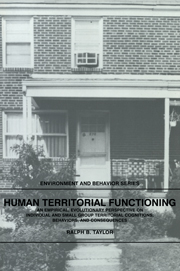 Human Territorial Functioning
Human Territorial Functioning Book contents
- Frontmatter
- Contents
- List of figures, tables, and boxes
- Series foreword
- Preface
- Acknowledgments
- 1 Introduction
- PART I ORIGINS OF HUMAN TERRITORIAL FUNCTIONING
- PART II A CONCEPTUAL MODEL OF HUMAN TERRITORIAL FUNCTIONING
- PART III TERRITORIAL FUNCTIONING IN SETTINGS OF VARYING CENTRALITY
- PART IV APPLICATIONS TO SOCIAL PROBLEMS
- PART V REVIEW AND PROSPECTS
- Index
- Frontmatter
- Contents
- List of figures, tables, and boxes
- Series foreword
- Preface
- Acknowledgments
- 1 Introduction
- PART I ORIGINS OF HUMAN TERRITORIAL FUNCTIONING
- PART II A CONCEPTUAL MODEL OF HUMAN TERRITORIAL FUNCTIONING
- PART III TERRITORIAL FUNCTIONING IN SETTINGS OF VARYING CENTRALITY
- PART IV APPLICATIONS TO SOCIAL PROBLEMS
- PART V REVIEW AND PROSPECTS
- Index
Summary
The present volume examines human territorial functioning, a closely linked constellation of place-specific, socially determined and influential cognitions, behaviors, and sentiments. Territorial functioning encompasses a class of environment–behavior transactions concerned with issues of personal and group identity, cohesiveness, control, access, and ecological management. This functioning applies largely to small groups, and the individuals in those groups, and is limited largely to small-scale, delimited spaces. The present chapter outlines the purposes of this book, sketches its major recurrent themes, and presents in capsule form a lowlevel theory, or model, of human territorial functioning. The materials to be covered in the various sections are also introduced.
Focus
The concept of human territorial functioning addresses the question: How do people “manage” the locations they own, occupy, or use for varying periods of time? Approaching this question is difficult, for two reasons.
Some problems
First, everyone knows something about territoriality, based on personal experience. Children at camp vie for the top bunks, siblings get upset and scream when a sister or brother enters their room unannounced, and in some households no one is allowed in the kitchen when dad is baking a cake. Frequently, territorial issues are resolved in the legal arena (see accompanying box). Further, territoriality is ensconced in our everyday lexicon with references to “turf battles” or phrases such as “a man's home is his castle”. (But see Figure 1.1.) Movies may trade on everyday notions of how people are territorial, Sam Peckinpah's Straw Dogs of the early 1970's or the more recent The Warriors being cases in point.
- Type
- Chapter
- Information
- Human Territorial FunctioningAn Empirical, Evolutionary Perspective on Individual and Small Group Territorial Cognitions, Behaviors, and Consequences, pp. 1 - 14Publisher: Cambridge University PressPrint publication year: 1988
